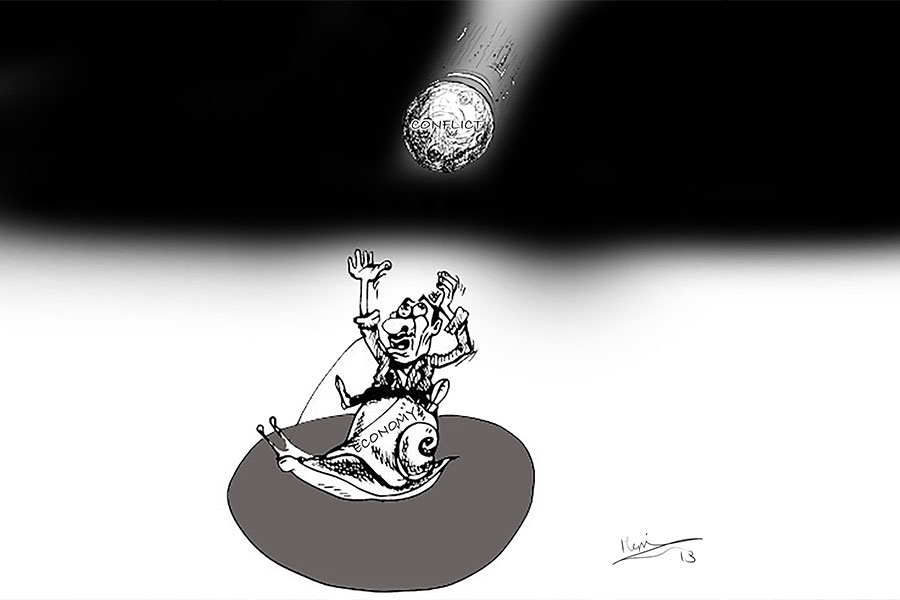
Oct 9 , 2021
By Kidist Yidnekachew
We have all heard it said, “looks can be deceiving,” which is often used to refer to something that seems good on the outside but does not have the matching qualities the deeper we go. An external appearance can indeed be misleading. Another saying has the same meaning, “don’t judge a book by its cover.” We judge anyway. But if there is one place where we do not always get what we see, it is restaurants.
Eateries put up big banners of the foods they claim to prepare. Once we get inside and order, we sometimes find out they do not even make that kind of food. Other times, they do prepare the meal. But it is usually not, say, the delicious-looking beef burger with crispy French fries that they serve but a poor replica of it. Unsurprisingly, neither does it taste good.
Other times, it is dairy product shops, who hang out posters depicting cheese. Often, they do not have it. When I asked why they post the picture if they do not have the product, they commonly say that they had it at some point but stopped selling it eventually.
Why though? Why mislead customers? Instead of spending money on printing out unrealistic banners, why not work on perfecting recipes and refining menus?
I cannot mention the number of times I have been deceived by the posters outside and ended up being served food that made me regret it. I gave so many eateries the benefit of the doubt, but only to be disappointed. Some places do not even get the spelling of the food right. One of the most commonly misspelt words is “burger” usually written on menus as “berger.”
The whole phenomenon is all the more annoying when it comes to domestic cuisine. The other day, I went to a restaurant with my cousin, and we ordered tibs, stir-fried beef. The tibson the poster looked yummy, with its well cooked but soft meat. When our order came, the meat looked to have been minced. Not only that, it was tough to chew. On top of that, the injera, flatbread, they brought tasted like vinegar. We still forked over 300 Br in the end.
Sometimes, the problem is not just false advertising but negligence as well. We see this on big banners put up by government institutions or major companies. Considering the amount of money these institutions spend on printing out and hanging the posters, it would be wise to check for spelling errors or typos one last time before printing them out. It would not kill them to invest in a copy editor or two.
The problem of advertising that misguides others is ubiquitous to the point that it can even be found when people interview for jobs. When candidates are being interviewed for a job, they tend to name or make up qualities they do not possess either out of desperation or eagerness to get the job. Later, they get hired and fail to live up to the employer’s expectations because of false representation of themselves.
No doubt, if they say they do not have any qualities or could not think of any, then they will not get the job. This leads us to believe that being oneself or being honest about our limitations makes us appear unworthy – being ourselves is just not enough. Our foods are not good enough. Thus we have to hang giant banners to attract customers even though the food we serve looks nothing like what is depicted outside; we do not like the way we look; thus, we put makeup on. Our voices are not good, so we cover it up with autotune. The list goes on.
How about striving in accepting ourselves and working on the things we can change instead of spending time and energy on creating a false identity?
PUBLISHED ON
Oct 09,2021 [ VOL
22 , NO
1119]


Sunday with Eden | Jul 23,2022

Fortune News | Sep 11,2020

My Opinion | Nov 18,2023

Fortune News | May 15,2021

Radar | Apr 19,2025

Life Matters | Aug 17,2019

Commentaries | Sep 19,2020

Verbatim | Feb 06,2021

Commentaries | Sep 21,2019

Editorial | Nov 21,2020

My Opinion | 131656 Views | Aug 14,2021

My Opinion | 128020 Views | Aug 21,2021

My Opinion | 125983 Views | Sep 10,2021

My Opinion | 123607 Views | Aug 07,2021

Dec 22 , 2024 . By TIZITA SHEWAFERAW
Charged with transforming colossal state-owned enterprises into modern and competitiv...

Aug 18 , 2024 . By AKSAH ITALO
Although predictable Yonas Zerihun's job in the ride-hailing service is not immune to...

Jul 28 , 2024 . By TIZITA SHEWAFERAW
Unhabitual, perhaps too many, Samuel Gebreyohannes, 38, used to occasionally enjoy a couple of beers at breakfast. However, he recently swit...

Jul 13 , 2024 . By AKSAH ITALO
Investors who rely on tractors, trucks, and field vehicles for commuting, transporting commodities, and f...

Jun 28 , 2025
Meseret Damtie, the assertive auditor general, has never been shy about naming names...

Jun 21 , 2025
A well-worn adage says, “Budget is not destiny, but it is direction.” Examining t...

Jun 14 , 2025
Yet again, the Horn of Africa is bracing for trouble. A region already frayed by wars...

Jun 7 , 2025
Few promises shine brighter in Addis Abeba than the pledge of a roof for every family...

Jun 29 , 2025
Addis Abeba's first rains have coincided with a sweeping rise in private school tuition, prompting the city's education...

Jun 29 , 2025 . By BEZAWIT HULUAGER
Central Bank Governor Mamo Mihretu claimed a bold reconfiguration of monetary policy...

Jun 29 , 2025 . By BEZAWIT HULUAGER
The federal government is betting on a sweeping overhaul of the driver licensing regi...

Jun 29 , 2025 . By NAHOM AYELE
Gadaa Bank has listed 1.2 million shares on the Ethiopian Securities Exchange (ESX),...